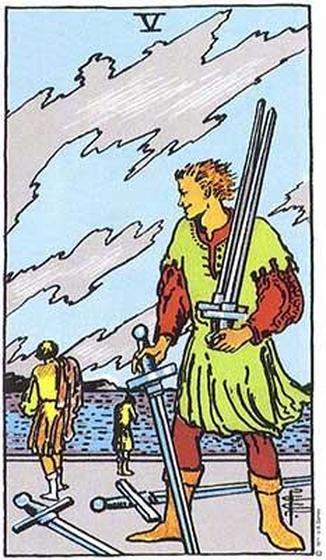Here’s what to watch for:
* The 38th hexagram of the I Ching is sometimes called “Estrangement,” and it depicts two sisters living together while having very different agendas. While they may experience disharmony on the big stuff, the hexagram advises that they may experience progress with regard to the small stuff.
* Big fights, big ideological differences, had constantly in relationships, are exhausting. We can cope with exhaustion in a variety of different ways. We can start to shun the “object” of our exhaustion, but then we become like two feuding siblings who become dissociated from each other. We are bound by each other’s differences and bound to keep repeating the civil war they represent, try as we may to separate ourselves from the “other.” “He/she exhausts me,” we say. “We are just too different,” we say. And yet, the thing we angrily reject, that very thing that we find totally exasperating, we remain bound to, even as we try to separate ourselves from it with great vigor.
* The sign of something truly being released is that it has naturally “fallen off,” in the same way that hair falls out or the fruit, once connected to the tree, falls off. In fact, in Ancient astrology, the word for a planetary aspect separating, “aporroia,” was related to the image of hair growing out from the head and then falling of, as in death, or the fruit of a tree falling away from what it was once connected to.
* When planets are in the process of separating, the transits are also in the process of bearing fruit, of disseminating lessons or delivering the goods.
* The Sun separating from Mars/Neptune and Mars separating from Neptune, is like the image of pilgrims or soldiers, either exhausted, defeated, or victorious but bloodied, walking home after battle. However, wars have a way of living on…
* Hexagram 38 suggests that where big divides exist they are likely to continue existing. The key to bridging the gap is thus to focus on small areas of agreement. In this way, we learn to coexist despite the gaping differences, which we learn to live with as everyday things…as common as a brother or sister we love despite having deeper disagreements with.
* Once I asked my Grandfather if he thought war actually solved anything. He was a Korean combat veteran. He scoffed, “If you win, then yes.” Then he sat for a moment, and I could see him returning to the battlefield in his mind. After a few beats, he added, “But winning or losing the war doesn’t change how people feel. They still believe their cause was the right one.”
* At one point during the war, my grandfather had grown very fond of a young orphaned boy that his platoon had stumbled across. He always got soft, and small, and his recollection for the details would get stronger when talking about him.
* We are healed by staying small in the midst of large, bold, eternal conflicts. Our recollection of each other’s eternity usually happens in small things and gentle moments, not so much the swashbuckling holy wars of the Sun, Mars, and Neptune.
* We win far too many battles while losing the war for everyday sacredness.
* The sixth line of the 38th hexagram shows a person falsely perceiving an enemy coming toward her. She draws her bow. Then she realizes this person approaching is a friend. As her doubts and aggressions settle, a light rain falls down, bringing healing and good fortune.
* If she doesn’t heed this warning, hexagram 38 turns to 51, Thunder, which shocks us back into good manners and sacred attention to the small and ceremonial details of life.
Prayer: Help us to lay aside the weapons of our beliefs, returning to the small and the sacred. Make our lives altars, upon which rest in happiness the artifacts of our convictions, made gentle by daily care, and familiar to all by our brotherly and sisterly love.



Leave a Reply